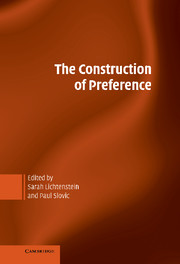Book contents
- Frontmatter
- Contents
- Contributors
- Preface
- Acknowledgments
- I INTRODUCTION
- II PREFERENCE REVERSALS
- III PSYCHOLOGICAL THEORIES OF PREFERENCE REVERSALS
- IV EVIDENCE FOR PREFERENCE CONSTRUCTION
- V THEORIES OF PREFERENCE CONSTRUCTION
- VI AFFECT AND REASON
- VII MISWANTING
- VIII CONTINGENT VALUATION
- IX PREFERENCE MANAGEMENT
- References
- Index
Preface
Published online by Cambridge University Press: 05 June 2012
- Frontmatter
- Contents
- Contributors
- Preface
- Acknowledgments
- I INTRODUCTION
- II PREFERENCE REVERSALS
- III PSYCHOLOGICAL THEORIES OF PREFERENCE REVERSALS
- IV EVIDENCE FOR PREFERENCE CONSTRUCTION
- V THEORIES OF PREFERENCE CONSTRUCTION
- VI AFFECT AND REASON
- VII MISWANTING
- VIII CONTINGENT VALUATION
- IX PREFERENCE MANAGEMENT
- References
- Index
Summary
According to the most prominent view in contemporary social science, human beings “have” preferences, and their choices are a product of those preferences. If people are going to select an ice cream flavor, or a television set, or a political candidate, they will consult a kind of internal preference menu, and their choices will result from that consultation. This approach to human behavior dominates economics; it also plays a large role in many other fields, including political science, law, and sociology.
But are people's preferences really elicited, rather than constructed, by social situations? This is an empirical question. Over the last decades, a great deal of progress has been made in answering it. Sometimes people prefer A to B and B to A, depending on how the options are framed. If people are told, “Of those who undergo this medical procedure, 90% are still alive after 5 years,” they are far more likely to agree to the procedure than if they are told, “Of those who undergo this procedure, 10% are dead after 5 years.” Framing matters for ordinary consumer choices as well as for unusual medical decisions. Most consumers might prefer a small television to a medium-sized one when choosing among the two, but if a large television is added to the set of options, many consumers will favor the medium-sized one over the small one. The same point applies to jury determinations.
- Type
- Chapter
- Information
- The Construction of Preference , pp. xv - xviPublisher: Cambridge University PressPrint publication year: 2006
- 1
- Cited by



